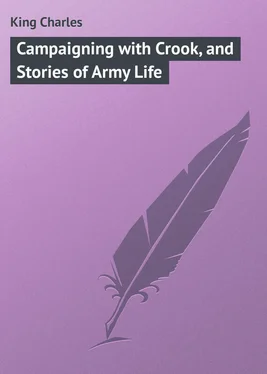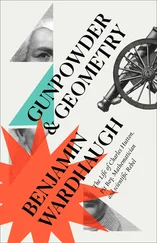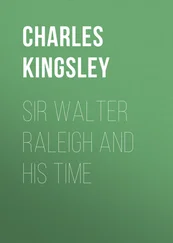Charles King - Campaigning with Crook, and Stories of Army Life
Здесь есть возможность читать онлайн «Charles King - Campaigning with Crook, and Stories of Army Life» — ознакомительный отрывок электронной книги совершенно бесплатно, а после прочтения отрывка купить полную версию. В некоторых случаях можно слушать аудио, скачать через торрент в формате fb2 и присутствует краткое содержание. Жанр: foreign_prose, на английском языке. Описание произведения, (предисловие) а так же отзывы посетителей доступны на портале библиотеки ЛибКат.
- Название:Campaigning with Crook, and Stories of Army Life
- Автор:
- Жанр:
- Год:неизвестен
- ISBN:нет данных
- Рейтинг книги:5 / 5. Голосов: 1
-
Избранное:Добавить в избранное
- Отзывы:
-
Ваша оценка:
- 100
- 1
- 2
- 3
- 4
- 5
Campaigning with Crook, and Stories of Army Life: краткое содержание, описание и аннотация
Предлагаем к чтению аннотацию, описание, краткое содержание или предисловие (зависит от того, что написал сам автор книги «Campaigning with Crook, and Stories of Army Life»). Если вы не нашли необходимую информацию о книге — напишите в комментариях, мы постараемся отыскать её.
Campaigning with Crook, and Stories of Army Life — читать онлайн ознакомительный отрывок
Ниже представлен текст книги, разбитый по страницам. Система сохранения места последней прочитанной страницы, позволяет с удобством читать онлайн бесплатно книгу «Campaigning with Crook, and Stories of Army Life», без необходимости каждый раз заново искать на чём Вы остановились. Поставьте закладку, и сможете в любой момент перейти на страницу, на которой закончили чтение.
Интервал:
Закладка:
CHAPTER V.
THE ASSEMBLY OF THE B. H. AND Y
Friday, the 4th of August, 1876, was a busy day in the camp of General Crook. He had been waiting impatiently for the coming of the Fifth Cavalry, in order that he might resume the offensive, and, to use his own words, "finish the campaign in one crushing blow." The tragic success of the Indians on the Little Big Horn, of June 25th, resulting in the annihilation of Custer and five companies of the Seventh Cavalry, compelled General Terry to fall back to the Yellowstone, where he set about the reorganization of his command; and, safely intrenched in his supply camp at the mouth of the Tongue River, he too had been awaiting the arrival of reinforcements. General Miles, with his fine regiment, the Fifth Infantry, was hurried up the Missouri from Fort Leavenworth, and companies of the Twenty-second Infantry, from the Lakes, also hastened to join him. They were stemming the muddy current of the great river as fast as the light-draft steamers could carry them, while we were marching up from Fetterman to join General Crook.
On the 4th of August, Terry's command, consisting of the remnant of the Seventh Cavalry, one battalion of the Second Cavalry, the Fifth Infantry (Miles), Seventh Infantry (Gibbon), a battalion of the Twenty-second, and the Sixth Infantry garrison at Fort Buford, threatened the hostiles on the side of the Yellowstone; while General Crook, with the entire Third Cavalry, ten companies of the Fifth, and four of the Second Cavalry, and an admirable infantry command, consisting of detachments from the Fourth, Ninth, and Fourteenth regiments, was preparing to advance upon them from the south. The two armies were not more than one hundred and twenty-five miles apart, yet communication between them was impossible. The intervening country swarmed with warriors, six to eight thousand in number, completely armed, equipped, supplied, and perfectly mounted. Crook had sallied forth and fought them on the 17th of June, and found them altogether too strong and dexterous, so he retired to Goose Creek once more; and here he lay on the 25th of June, when Custer was making his attack and meeting his fate – only fifty miles away, and not a soul of our command had the faintest idea of what was going on.
Warily watching the two commands, the Indians lay uneasily between Crook and Terry. Noting the approach of strong reinforcements to both, they proceeded to get their women and children out of the way, sending them eastward across Terry's front, and preparing to do likewise themselves when the time came for them to start. On the 5th of August the two armies moved towards each other. On the 10th they met; and one of the most comical sights I ever witnessed was this meeting, and one of the most unanswerable questions ever asked was, "Why, where on earth are the Indians?"
However, August the 4th was a day of busy preparation. At ten a.m. the regimental and battalion commanders met in council at General Crook's headquarters, and by noon the result of their deliberations was promulgated. From the reports of his scouts and allies, General Crook had every reason to believe that he would find the mass of Indians posted in strong force somewhere among the bluffs and uplands of the Rosebud, two days' march away to the north. He had been unable to hear from General Terry or to communicate with him. Lieutenant Sibley, of the Second Cavalry, a young officer of great ability, and universally conceded to be as full of cool courage as any man could well be, had made a daring attempt to slip through with thirty picked men; but the Indians detected him quick as a flash, and after a desperate fight he managed to get back to the command with most of his men, but with the loss of all his horses.
The organization of the command was announced at one p.m.: General Crook to command in person, his faithful aide-de-camp, Bourke, to act as adjutant-general, while his staff consisted of Lieutenant Schuyler, Fifth Cavalry, junior aide-de-camp; Dr. B. A. Clements, medical director, assisted by Drs. Hartsuff and Patzki; Major J. V. Furey, chief quartermaster; Captain J. W. Bubb, chief commissary; Major George M. Randall, chief of scouts and Indian allies; and the bloodthirsty paymaster, our old friend Major Stanton, was the general utility man.
The cavalry was organized as a brigade, with General Merritt in command – Lieutenants Forbush and Hall, Fifth Cavalry, Pardee and Young, of the infantry, serving as staff. General Carr took command of the Fifth Cavalry, with myself as adjutant; and for the first time the promotions which had occurred in the regiment consequent upon the death of General Custer were recognized in the assignments to command. The commissions had not yet been received from Washington, but all knew the advancement had been made. So my old captain, now become Major Mason, turned over Company "K" to its new captain, Woodson, and was detailed to command the Second Battalion of the Fifth Cavalry, consisting of Companies "B," "D," "E," "F," and "K," while the First Battalion – Companies "A," "C," "G," "I," and "M" – remained, as heretofore, under the leadership of our fellow-citizen Major Upham.
The Third Cavalry was commanded by Lieutenant-Colonel Royall, under whom also was the battalion of the Second Cavalry. Consequently, it was his distinguished privilege to issue orders to four battalions, while his senior officer and quondam commander, Lieutenant-Colonel Carr (brevet major-general) had only two. This was a source of much good-natured raillery and mutual chaffing on the part of these two veteran campaigners, and it was Royall's ceaseless delight to come over and talk to Carr about "my brigade," and to patronizingly question him about "your a – detachment." In fact, I believe that Colonel Royall so far considered his command a brigade organization that his senior major, Colonel Evans, assumed command of the Third Cavalry as well as his own battalion; but, as this was a matter outside of my own sphere of duties, I cannot make an assertion.
The infantry was a command to be proud of, and Lieutenant-Colonel Alexander Chambers was the man to appreciate it. Detachments from three fine regiments gave him a full battalion of tough, wiry fellows, who had footed it a thousand miles that summer, and we were all the better prepared to march two thousand more.
With every expectation of finding our foes close at hand, General Crook's orders were concise enough. As given to me by General Carr, and recorded in my note-book, I transcribe them here: "All tents, camp equipage, bedding, and baggage, except articles hereinafter specified, to be stored in the wagons, and wagons turned over to care of chief quartermaster by sunrise to-morrow. Each company to have their coffee roasted and ground and turned over to the chief commissary at sunset to-night. Wagons will be left here at camp. A pack-train of mules will accompany each battalion on the march, for the protection of which the battalion will be held responsible. The regiment will march at seven a.m. to-morrow, 'prepared for action,' and company commanders will see to it that each man carries with him on his person one hundred rounds carbine ammunition and four days' rations, overcoat and one blanket on the saddle. Fifty rounds additional per man will be packed on mules. Four extra horses, not to be packed, will be led with each company. Curry-combs and brushes will be left in wagons. Special instructions for action : All officers and non-commissioned officers to take constant pains to prevent wastage of ammunition."
That was all. From the general down to subalterns the officers started with no more clothing than they had on and the overcoat and blanket indicated in that order. Many, indeed, officers and men, thinking to be back in a week, left overcoats behind, as superfluous in that bright August weather. When I tell you it was ten weeks before we saw those wagons again, meantime the weather having changed from summer sun to mountain storm and sleet, and we having tramped some eight hundred miles, you can fancy what a stylish appearance the Fifth Cavalry – indeed, the whole expedition – presented as it marched into the Black Hills the following September.
Читать дальшеИнтервал:
Закладка:
Похожие книги на «Campaigning with Crook, and Stories of Army Life»
Представляем Вашему вниманию похожие книги на «Campaigning with Crook, and Stories of Army Life» списком для выбора. Мы отобрали схожую по названию и смыслу литературу в надежде предоставить читателям больше вариантов отыскать новые, интересные, ещё непрочитанные произведения.
Обсуждение, отзывы о книге «Campaigning with Crook, and Stories of Army Life» и просто собственные мнения читателей. Оставьте ваши комментарии, напишите, что Вы думаете о произведении, его смысле или главных героях. Укажите что конкретно понравилось, а что нет, и почему Вы так считаете.












